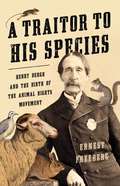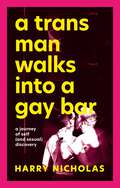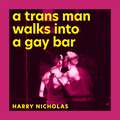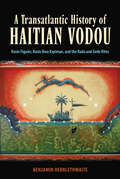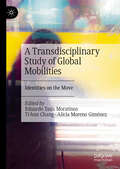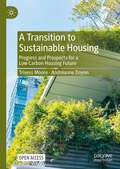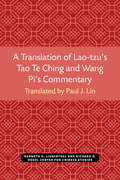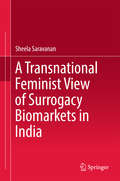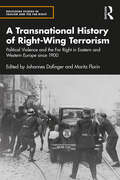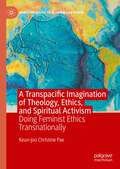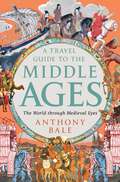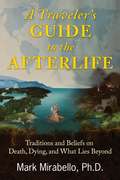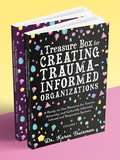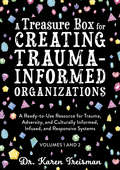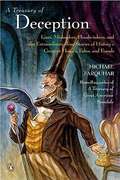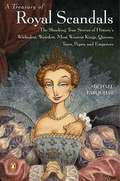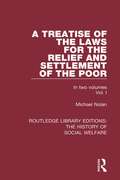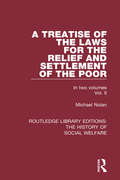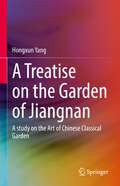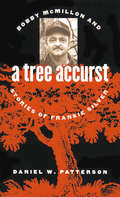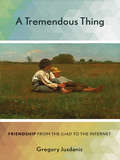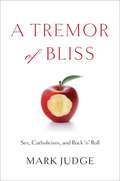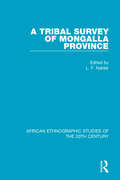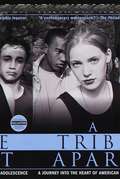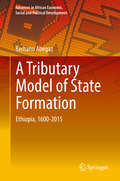- Table View
- List View
A Traitor to His Species: Henry Bergh and the Birth of the Animal Rights Movement
by Ernest FreebergFrom an award-winning historian, the outlandish story of the man who gave rights to animals.In Gilded Age America, people and animals lived cheek-by-jowl in environments that were dirty and dangerous to man and beast alike. The industrial city brought suffering, but it also inspired a compassion for animals that fueled a controversial anti-cruelty movement. From the center of these debates, Henry Bergh launched a shocking campaign to grant rights to animals.A Traitor to His Species is revelatory social history, awash with colorful characters. Cheered on by thousands of men and women who joined his cause, Bergh fought with robber barons, Five Points gangs, and legendary impresario P.T. Barnum, as they pushed for new laws to protect trolley horses, livestock, stray dogs, and other animals. Raucous and entertaining, A Traitor to His Species tells the story of a remarkable man who gave voice to the voiceless and shaped our modern relationship with animals.
A Trans Man Walks Into a Gay Bar: A Journey of Self (and Sexual) Discovery
by Harry Nicholas'On the bookshelves, there was plenty of stuff on being gay, and much needed, joyous accounts of what it is to be trans, but nothing really that encapsulates what is it to be both - to exist in the hazy terrain between.'After his relationship with his girlfriend of 5 years ended, Harry realised he was a single adult for the first time - not only that, but a single, transmasculine and newly out gay man.Despite knowing it was the right decision, the reality of his new situation was terrifying. How could he be a gay man, when he was still learning what it was to be a man? Would the gay community embrace him or reject him? What would gay sex be like? And most importantly, would finding love again be possible?In this raw, intimate and unflinchingly honest book, we follow Harry as he navigates the sometimes fraught and contradictory worlds of contemporary gay culture as a trans gay man, from Grindr, dating and gay bars, to saunas, sex and ultimately, falling in love. Harry's brave and uplifting journey will show you there is joy in finding who you are.
A Trans Man Walks Into a Gay Bar: A Journey of Self (and Sexual) Discovery
by Harry NicholasLONGLISTED FOR THE POLARI PRIZE 2024'On the bookshelves, there was plenty of stuff on being gay, and much needed, joyous accounts of what it is to be trans, but nothing really that encapsulates what is it to be both - to exist in the hazy terrain between.'After his relationship with his girlfriend of 5 years ended, Harry realised he was a single adult for the first time - not only that, but a single, transmasculine and newly out gay man.Despite knowing it was the right decision, the reality of his new situation was terrifying. How could he be a gay man, when he was still learning what it was to be a man? Would the gay community embrace him or reject him? What would gay sex be like? And most importantly, would finding love again be possible?In this raw, intimate and unflinchingly honest book, we follow Harry as he navigates the sometimes fraught and contradictory worlds of contemporary gay culture as a trans gay man, from Grindr, dating and gay bars, to saunas, sex and ultimately, falling in love. Harry's brave and uplifting journey will show you there is joy in finding who you are.
A Transatlantic History of Haitian Vodou: Rasin Figuier, Rasin Bwa Kayiman, and the Rada and Gede Rites
by Benjamin HebblethwaiteConnecting four centuries of political, social, and religious history with fieldwork and language documentation, A Transatlantic History of Haitian Vodou analyzes Haitian Vodou’s African origins, transmission to Saint-Domingue, and promulgation through song in contemporary Haiti.Split into two sections, the African chapters focus on history, economics, and culture in Dahomey, Allada, and Hueda while scrutinizing the role of Europeans in fomenting tensions. The political, military, and slave trading histories of the kingdoms in the Bight of Benin reveal the circumstances of enslavement, including the geographies, ethnicities, languages, and cultures of enslavers and enslaved. The study of the spirits, rituals, structure, and music of the region’s religions sheds light on important sources for Haitian Vodou. Having royal, public, and private expressions, Vodun spirit-based traditions served as cultural systems that supported or contested power and enslavement. At once suppliers and victims of the European slave trade, the people of Dahomey, Allada, and Hueda deeply shaped the emergence of Haiti’s creolized culture. The Haitian chapters focus on Vodou’s Rada Rite (from Allada) and Gede Rite (from Abomey) through the songs of Rasin Figuier’s Vodou Lakay and Rasin Bwa Kayiman’s Guede, legendary rasin compact discs released on Jean Altidor’s Miami label, Mass Konpa Records. All the Vodou songs on the discs are analyzed with a method dubbed “Vodou hermeneutics” that harnesses history, religious studies, linguistics, literary criticism, and ethnomusicology in order to advance a scholarly approach to Vodou songs.
A Transdisciplinary Study of Global Mobilities: Identities on the Move
by Eduardo Tasis Moratinos Ti-Han Chang Alícia Moreno GiménezIdentities on the Move interrogates the categories given and adopted by people on the move through a transdisciplinary and global approach that includes social and political sciences and the arts. It brings together experiences of displacement from a variety of cultural and national backgrounds, including Brazilians, Chinese, Koreans, South Italians, Africans, Muslims, Arabophobe migrants, Iranians, Pakistanis, Bosnians, Latin Americans and Eastern Europeans. It looks at their identity-negotiating processes in different geographies across the globe, namely Japan, UK, Palestine, Italy, Australia, Europe and North America. This multi-geographical and multi-disciplinary approach allows us to decentralise previous narratives of migration by reformulating them against coloniality and invisibility and presenting them within a richer and changing contemporary map of dynamic identities. The global scale of the case studies included in this volume also allows for a wider exploration of thematic concepts within the (trans)formation of displaced identities, such as assimilation versus alienation, memory and trauma, stigmatisation, enculturation, acculturation and deculturation. In a nutshell, this volume highlights current complexities of identity formation in a global scene that is moving away from homogenous nations by presenting a multi-layered and multi-spatial notion of belonging.
A Transition to Sustainable Housing: Progress and Prospects for a Low Carbon Housing Future
by Trivess Moore Andréanne DoyonThis open access book explores the environmental, social, and financial challenges of housing provision, and the urgent need for a sustainable housing transition. The authors explore how market failures have impacted the scaling up of sustainable housing and the various policy attempts to address this. Going beyond an environmental focus, the book explores a range of housing-related challenges including social justice and equity issues. Sustainability transitions theory is presented as a framework to help facilitate a sustainable housing transition and a range of contemporary case studies are explored on issues including high performing housing, small housing, shared housing, neighbourhood-scale housing, circular housing, and innovative financing for housing. It is an important new resource that challenges policy makers, planners, housing construction industry stakeholders, and researchers to rethink what housing is, how we design and construct it, and how we can better integrate impacts on households to wider policy development.
A Translation of Lao-tzu’s Tao Te Ching and Wang Pi’s Commentary (Michigan Monographs In Chinese Studies #30)
by Paul J. LinDuring the Spring-Autumn period (722–420 BCE) and the time of the Warring States (480–222 CE), China was in great turmoil. Intellectuals and social reformers sifted through their wisdom and knowledge of China’s experiences up to then, attempting to find a solution to their situation. The Tao Te Ching, one of the foremost products of the era, is a metaphysical book, a source of the highest political thought. Many readers have found in it representations of the highest ideals of human endeavors. Yet given its likely oral origin and the technological limitations of its early textual transmission, the Tao Te Ching raises numerous questions related to authorship, date of origin, internal organization, textual coherence, and editorial history. Of the scores of translations of the Tao Te Ching, the great majority are based on the edition prepared by the third-century scholar Wang Pi. Wang’s profound commentary is itself a deeply influential text in the development of Taoist thought. Paul Lin presents the commentary, otherwise unavailable in English, in the form of footnotes accompanying his meticulous rendition of the Taoist classic.
A Transnational Feminist View of Surrogacy Biomarkets in India
by Sheela SaravananThis book takes a reproductive justice approach to argue that surrogacy as practised in the contemporary neoliberal biomarkets crosses the humanitarian thresholds of feminism. Drawing on her ethnographic work with surrogate mothers, intended parents and medical practitioners in India, the author shows the dark connections between poverty, gender, human rights violations and indignity in the surrogacy market. In a developing country like India, bio-technologies therefore create reproductive objects of certain female bodies while promoting an image of reproductive liberation for others. India is a classic example for how far these biomarkets can exploit vulnerabilities for individual requirements in the garb of reproductive liberty. This critical book refers to a range of liberal, radical and postcolonial feminist frameworks on surrogacy, and questions the individual reproductive rights perspective as an approach to examine global surrogacy. It introduces ‘humanitarian feminism’ as an alternative concept to bridge feminist factions divided on contextual and ideological grounds. It hopes to build a global feminist solidarity drawing on a ‘reproductive justice’ approach by recognizing the histories of race, class, gender, sexuality, ability, age and immigration oppression in all communities. This work is of interest to researchers and students of medical sociology and anthropology, gender studies, bioethics, and development studies.
A Transnational History of Right-Wing Terrorism: Political Violence and the Far Right in Eastern and Western Europe since 1900 (Routledge Studies in Fascism and the Far Right)
by Johannes DafingerA Transnational History of Right-Wing Terrorism offers new insights into the history of right-wing extremism and violence in Europe, East and West, from 1900 until the present day. It is the first book to take such a broad historical approach to the topic. The book explores the transnational dimension of right-wing terrorism; networks of right-wing extremists across borders, including in exile; the trading of arms; the connection between right-wing terrorism and other forms of far-right political violence; as well as the role of supportive elements among fellow travelers, the state security apparatus, and political elites. It also examines various forms of organizational and ideological interconnectedness and what inspires right-wing terrorism. In addition to several empirical chapters on prewar extreme-right political violence, the book features extensive coverage of postwar right-wing terrorism including the recent resurgence in attacks. This book will be of great interest to students and scholars of right-wing extremism, fascism, Nazism, terrorism, and political violence.
A Transpacific Imagination of Theology, Ethics, and Spiritual Activism: Doing Feminist Ethics Transnationally (New Approaches to Religion and Power)
by Keun-joo Christine PaeDespite prolific feminist voices in Christian ethics, transnational perspectives are still underdeveloped. Similarly, ‘secular’ transnational feminist scholarship often overlooks religious faith, rituals, and spirituality, crucial to many women’s liberation movements across the globe. This book aims to fill these gaps in Christian and secular feminist scholarships by constructing a transnational feminist theo-ethics. Furthermore, by bringing the theological and the transnational together, the book offers an alternative tool in analyzing social identities beyond intersectionality (i.e., interstitial approach and interstitial integrity) and thus, renews feminist theological understandings, especially of time, memories, and healing beyond linear approaches. A renewed analytical tool would help the readers critically reinterrogate the global power structure buttressed by empire, militarized capitalism, and heteropatriarchal religious ideologies at the cost of raced, sexed, and classed bodies. At the same time, the book would create space where readers create and recreate theo-ethical visions for global peace and justice constructed upon transnational feminist praxis of solidarity and spiritual activism. Case studies offer concrete sites to inform readers about how to use transnational feminist theories at a micro- and macropolitical levels, and produce transnational feminist knowledge of God, spiritual activism, and solidarity. This book is written for graduate and advanced undergraduate students in religion, gender studies, and Asian/American studies to critically engage in the political, the theological, and the spiritual from transnational perspectives not as observers but as active participants in global politics.
A Travel Guide to the Middle Ages: The World Through Medieval Eyes
by Anthony BaleA captivating journey of the expansive world of medieval travel, from London to Constantinople to the court of China and beyond. Europeans of the Middle Ages were the first to use travel guides to orient their wanderings, as they moved through a world punctuated with miraculous wonders and beguiling encounters. In this vivid and alluring history, medievalist Anthony Bale invites readers on an odyssey across the medieval world, recounting the advice that circulated among those venturing to the road for pilgrimage, trade, diplomacy, and war. Journeying alongside scholars, spies, and saints, from Western Europe to the Far East, the Antipodes and the ends of the earth, Bale provides indispensable information on the exchange rate between Bohemian ducats and Venetian groats, medieval cures for seasickness, and how to avoid extortionist tour guides and singing sirens. He takes us from the streets of Rome, more ruin than tourist spot, and tours of the Khan’s court in Beijing to Mamluk-controlled Jerusalem, where we ride asses across the holy terrain, and bustling bazaars of Tabriz. We also learn of rumored fantastical places, like ones where lambs grow on trees and giant canes grow fruit made of gems. And we are offered a glimpse of what non-European travelers thought of the West on their own travels. Using previously untranslated contemporaneous documents from a colorful range of travelers, and from as far and wide as Turkey, Iceland, North Africa, and Russia, A Travel Guide to the Middle Ages is a witty and unforgettable exploration of how Europeans understood—and often misunderstood—the larger world.
A Traveler's Guide to the Afterlife: Traditions and Beliefs on Death, Dying, and What Lies Beyond
by Mark MirabelloA grand survey of the world’s death and afterlife traditions throughout history • Examines beliefs from many different cultures on the soul, heaven, hell, and reincarnation; instructions for accessing the different worlds of the afterlife; how one may become a god; and how ethics and the afterlife may not be connected • Explores techniques to communicate with the dead, including séance instructions • Includes an extensive bibliography of more than 900 sources from around the world Drawing on death and afterlife traditions from cultures around the world, Mark Mirabello explores the many forms of existence beyond death and each tradition’s instructions to access the afterlife. He examines beliefs on the soul, heaven, hell, and reincarnation and wisdom from Books of the Dead such as the Book of Going Forth by Day from Egypt, the Katha Upanishad from India, the Bardo Thodol from Tibet, the Golden Orphic Tablets from Greece, Lieh Tzu from China, and Heaven and its Wonders and Hell from Things Heard and Seen from 18th-century Europe. Considering the question “What is Death?” Mirabello provides answers from a wide range of ancient and modern thinkers, including scientist Nicholas Maxwell, the seer Emanuel Swedenborg, 1st-century Buddhist philosopher Nagarjuna, and Greek philosopher Euripides, who opined that we may already be dead and only dreaming we are alive. He explores the trek of the soul through life and death with firsthand accounts of the death journey and notes that what is perceived as death here may actually be life somewhere else. He reveals how, in many traditions, ethics and the afterlife are not connected and how an afterlife is possible even without a god or a soul. Sharing evidence that consciousness is not simply a product of the brain, he offers a strong rebuttal to nihilists, materialists, and the Lokayata philosophical school of India who believe in the “finality” of death. He explains how specters and ghosts are produced and offers techniques to communicate with the dead as well as instructions for an out-of-body experience and the complete procedure for a séance. With an extensive bibliography of more than 900 sources, this guide offers comprehensive information on afterlife beliefs from the vast majority of cultures around the world and throughout history--a veritable “traveler’s guide” to the afterlife.
A Treasure Box for Creating Trauma-Informed Organizations: A Ready-to-Use Resource for Trauma, Adversity, and Culturally Informed, Infused and Responsive Systems (Therapeutic Treasures Collection)
by Dr Karen TreismanThis Treasure Box book is packed full of valuable resources from bestselling and award-winning author, trainer, organizational consultant, and Clinical Psychologist Dr. Karen Treisman, and will show you how to weave a deep understanding of trauma and adversity into the daily practice and the whole fabric of your organization.This expert knowledge is presented in a bright and easy to understand way. Every chapter contains a huge array of colour photocopiable worksheets, downloadable materials, practical ideas, reflective questions, and exercises ready to use both individually and organizationally. Covering guidance on policies, recruitment, supervision, language, cultural humility, co-production, team meeting ideas, staff wellbeing and more, this is the ultimate treasure trove for getting your organization truly and meaningfully trauma-informed.There are also contributors from all over the world within different contexts, from prisons to social care to schools to residential homes and much more, which illustrate how to take the ideas and apply them into real world practice.
A Treasure Box for Creating Trauma-Informed Organizations: A Ready-to-Use Resource for Trauma, Adversity, and Culturally Informed, Infused and Responsive Systems (Therapeutic Treasures Collection)
by Dr Karen TreismanThis Treasure Box book is packed full of valuable resources from bestselling and award-winning author, trainer, organizational consultant, and Clinical Psychologist Dr. Karen Treisman, and will show you how to weave a deep understanding of trauma and adversity into the daily practice and the whole fabric of your organization.This expert knowledge is presented in a bright and easy to understand way. Every chapter contains a huge array of colour photocopiable worksheets, downloadable materials, practical ideas, reflective questions, and exercises ready to use both individually and organizationally. Covering guidance on policies, recruitment, supervision, language, cultural humility, co-production, team meeting ideas, staff wellbeing and more, this is the ultimate treasure trove for getting your organization truly and meaningfully trauma-informed.There are also contributors from all over the world within different contexts, from prisons to social care to schools to residential homes and much more, which illustrate how to take the ideas and apply them into real world practice.
A Treasury of Deception
by Michael FarquharWe may say that honesty is the best policy, but history-to say nothing of business, politics, and the media-suggests otherwise. In this infinitely citable book, the author of two bestselling treasuries of scandal recounts some of the greatest deceptions of all time. With what forged document did the Vatican lay claim to much of Europe? Who wrote Hitler's diaries? Why do millions still believe the vague doggerel that Nostradamus passed off as prophecy? Organizing his material by theme (con artists, the press, military trickery, scientific fraud, imposters, great escapes, and more), Michael Farquhar takes in everything from the hoodwinking of Hitler to Vincent "the Chin" Gigante's thirty-year crazy act. A Treasury of Deception is a zestful, gossipy exposé-and celebration-of mendacity. A Treasury of Deception also includes:* Ten tricksters from scripture* Ten great liars in literature* Ten egregious examples of modern American doublespeak * Ten classic deceptions from Greek mythology
A Treasury of Royal Scandals: The Shocking True Stories History's Wickedest Weirdest MostWanton Kings Queens (A Michael Farquhar Treasury #1)
by Michael FarquharFrom Nero's nagging mother (whom he found especially annoying after taking her as his lover) to Catherine's stable of studs (not of the equine variety), here is a wickedly delightful look at the most scandalous royal doings you never learned about in history class. Gleeful, naughty, sometimes perverted-like so many of the crowned heads themselves-A Treasury of Royal Scandals presents the best (the worst?) of royal misbehavior through the ages. From ancient Rome to Edwardian England, from the lavish rooms of Versailles to the dankest corners of the Bastille, the great royals of Europe have excelled at savage parenting, deadly rivalry, pathological lust, and meeting death with the utmost indignity-or just very bad luck.
A Treatise of the Laws for the Relief and Settlement of the Poor: Volume I (Routledge Library Editions: The History of Social Welfare)
by Michael NolanFirst published in 1805, this work summarises the vast array of laws at the time on the relief of the poor in Great Britain. Split across two volumes, it not only condenses the laws themselves but also disentangles the theory and doctrine of each law and explains how the theory should have been applied in practice. This work will be a valuable primary source for those studying 19th poor relief and welfare.
A Treatise of the Laws for the Relief and Settlement of the Poor: Volume II (Routledge Library Editions: The History of Social Welfare)
by Michael NolanFirst published in 1805, this work summarises the vast array of laws at the time on the relief of the poor in Great Britain. Split across two volumes, it not only condenses the laws themselves but also disentangles the theory and doctrine of each law and explains how the theory should have been applied in practice. This work will be a valuable primary source for those studying 19th poor relief and welfare.
A Treatise on the Garden of Jiangnan: A study on the Art of Chinese Classical Garden
by Hongxun YangThis book presents a study into the art of Jiangnan classical garden. Jiangnan (“the south of the Yangtze River”) refers to the water network region along the lower reaches of the Changjiang River (formerly known as Yangtze River), where Jiangsu Province Chinese gardens were primarily constructed during the 16th and 17th centuries of the later Ming and early Qing dynasties. The Jiangnan garden, an architectural space where artificial and natural elements are combined, represents the elite of classical Chinese gardens and serves as a prime exemplar for its northern counterpart, the Ming and Qing imperial gardens.The book pursues an interdisciplinary approach, combining historical information with case studies and other methods. Charts and pictures are used to supplement and reinforce the conclusions drawn from the macro narrative, enhancing the authenticity and readability of the historical monographs. It represents the first study of the classical art of landscape design in China, offering readers an insightful introduction.
A Tree Accurst
by Daniel W. PattersonOn a wintry night in 1831, a man named Charlie Silver was murdered with an axe and his body burned in a cabin in the mountains of North Carolina. His young wife, Frankie Silver, was tried and hanged for the crime. In later years people claimed that a tree growing near the ruins of the old cabin was cursed--that anyone who climbed into it would be unable to get out. Daniel Patterson uses this "accurst" tree as a metaphor for the grip the story of the murder has had on the imaginations of the local community, the wider world, and the noted Appalachian traditional singer and storyteller Bobby McMillon.For nearly 170 years, the memory of Frankie Silver has been kept alive by a ballad and local legends and by the news accounts, fiction, plays, and other works they inspired. Weaving Bobby McMillon's personal story--how and why he became a taleteller and what this story means to him--into an investigation of the Silver murder, Patterson explores the genesis and uses of folklore and the interplay between folklore, social and personal history, law, and narrative as people and communities try to understand human character and fate.Bobby McMillon is a furniture and hospital worker in Lenoir, North Carolina, with deep roots in Appalachia and a lifelong passion for learning and performing traditional songs and tales. He has received a North Carolina Folk Heritage Award from the state's Arts Council and also the North Carolina Folklore Society's Brown-Hudson Folklore Award.
A Tremendous Thing: Friendship from the "Iliad" to the Internet
by Gregory Jusdanis"Why did you do all this for me?" Wilbur asked. "I don't deserve it. I've never done anything for you." “You have been my friend,” replied Charlotte. “That in itself is a tremendous thing.” —from Charlotte's Web by E. B. White Friendship encompasses a wide range of social bonds, from playground companionship and wartime camaraderie to modern marriages and Facebook links. For many, friendship is more meaningful than familial ties. And yet it is our least codified relationship, with no legal standing or bureaucratic definition. In A Tremendous Thing, Gregory Jusdanis explores the complex, sometimes contradictory nature of friendship, reclaiming its importance in both society and the humanities today. Ranging widely in his discussion, he looks at the art of friendship and friendship in art, finding a compelling link between our need for friends and our engagement with fiction. Both, he contends, necessitate the possibility of entering invented worlds, of reading the minds of others, and of learning to live with people. Investigating the ethics, aesthetics, and politics of friendship, Jusdanis draws from the earliest writings to the present, from the Epic of Gilgamesh and the Iliad to Charlotte's Web and “Brokeback Mountain,” as well as from philosophy, sociology, evolutionary biology, psychology, and political theory. He asks: What makes friends stay together? Why do we associate friendship with mourning? Does friendship contribute to the formation of political communities? Can friends desire each other? The history of friendship demonstrates that human beings are a mutually supportive species with an innate aptitude to envision and create ties with others. At a time when we are confronted by war, economic inequality, and climate change, Jusdanis suggests that we reclaim friendship to harness our capacity for cooperation and empathy.
A Tremor of Bliss: Sex, Catholicism, and Rock 'n' Roll
by Mark JudgeUp to the current day, matters of sexual morality—including contraception, abortion, premarital sex, and gay marriage—have polarized the Catholic Church. In the wake of the turmoil of the 1960s, when liberal theologians challenged the Church’s traditional views on the subject, a schism has opened. Much of the world, and many Catholics themselves, believe that the views of each camp are clear and well defined. As Mark Judge reveals in this trenchant and illuminating defense of the teachings of his Church, this is far from the case. Without sensationalism, Judge is candid here about his personal journey from the playgrounds of the sexual revolution to his eventual belief in the need to combine sexuality with love and commitment to another person, not as an end in itself but rather as a particularly direct means of opening oneself up to God’s love. He also sees support for the Christian theology on love in a seemingly unlikely place: rock music. He delves into the Church’s teachings on sexual matters, going back to the time of Saint Augustine, Saint Thomas Aquinas, Saint John of the Cross, and Pope John Paul II while also acquainting us with more contemporary voices from within the Church—as well as from the pop charts.From the Trade Paperback edition.
A Tribal Survey of Mongalla Province
by L. F. NalderOriginally published in 1937, this book describes and compares the tribes of the Mongalla Province in what is now South Sudan. In the second part of the book some 27 individual tribes are discussed in detail, and topics such as linguistics, culture, tribal structure, religious beliefs, crime and punishment, marriage, birth, burial and economic and agricultural life are also covered.
A Tribe Apart: A Journey into the Heart of American Adolescence
by Patricia HerschFor three fascinating, disturbing years, writer Patricia Hersch journeyed inside a world that is as familiar as our own children and yet as alien as some exotic culture--the world of adolescence. As a silent, attentive partner, she followed eight teenagers in the typically American town of Reston, Virginia, listening to their stories, observing their rituals, watching them fulfill their dreams and enact their tragedies. What she found was that America's teens have fashioned a fully defined culture that adults neither see nor imagine--a culture of unprecedented freedom and baffling complexity, a culture with rules but no structure, values but no clear morality, codes but no consistency.Is it society itself that has created this separate teen community? Resigned to the attitude that adolescents simply live in "a tribe apart," adults have pulled away, relinquishing responsibility and supervision, allowing the unhealthy behaviors of teens to flourish. Ultimately, this rift between adults and teenagers robs both generations of meaningful connections. For everyone's world is made richer and more challenging by having adolescents in it.
A Tributary Model of State Formation: Ethiopia, 1600-2015 (Advances in African Economic, Social and Political Development)
by Berhanu AbegazA Tributary Model of State Formation: Ethiopia, 1600-2015 addresses the perplexing question of why a pedigreed Ethiopian state failed to transform itself into a nation-state. Using a comparative-institutionalist framework, this book explores why Ethiopia, an Afroasian civilizational state, has yet to build a modern political order comprising a sturdy state, the rule of law, and accountability to the ruled. The book provides a theoretical framework that contrasts the European and the Afroasian modes of state formation and explores the three major variants of the Ethiopian state since 1600 (Gondar, Shewa, and Revolutionary). It does this by employing the conceptual entry point of tributarism and teases out the implications of this perspective for refashioning the embattled postcolonial African political institutions. The primary contribution of the book is the novel framing of state formation through the lens of a landed Afroasiatic peasantry in giving rise to a fragile state whose redistributive preoccupation preempted the emergence of a productive economy to serve as a buoyant revenue base. Unlike feudal Europe, the dependence of the Afroasian state on arm’s-length overlordship rather than on tightly-managed landlordship incentivized endemic extractive contests among elites with the capacity for violence for the non-fixed tribute from independent wealth producers. Tributarism, I argue here, stymied the transition from a resilient statehood to a robust nation-statehood that befits an open-order society. This book will be of interest to scholars in economics, political science, political economics, and African Studies. Berhanu Abegaz is Professor of Economics, College of William & Mary (USA).
